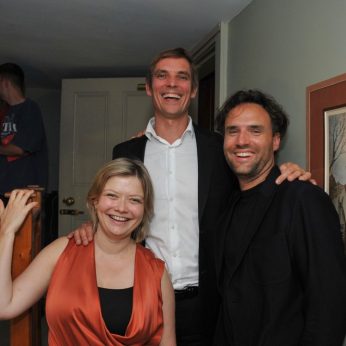Composer: Robert Schumann (b. 1810 - d. 1856)
Performance date: 25/06/2023
Venue: Bantry House
Composition Year: 1851
Duration: 00:29:06
Recording Engineer: Tom Norton, RTÉ
Instrumentation: vn, vc, pf
Instrumentation Category:Piano Trio
Artists:
Alina Ibragimova -
[violin]
Leonard Elschenbroich -
[cello]
Cédric Tiberghien -
[piano]

Piano Trio No.3 in G minor Op.110 [1851]
1. Bewegt, doch nicht zu rasch
2. Ziemlich langsam
3. Rasch
4. Kräftig, mit Humor
The Trio made a tremendous impression. It is original, abounding with passion, especially the Scherzo, which carries one along into the wildest depths. O how fortunate do I consider myself that heaven has provided me with the sense and sensibility to entirely grasp this spirit and this mind. So wrote Schumann’s wife Clara in her diary after the first performance of tonight’s Trio at one of the Schumann house music nights. Despite Clara’s enthusiastic reaction, this Trio more or less fell out of the repertoire until quite recently. There was a school of thought encouraged by Clara herself that derided Schumann’s late works as examples of his creative decline before his incarceration in Endenich Asylum in 1854. This well-meant but careless criticism also affected the magnificent A minor and D minor Violin Sonatas written that same autumn, a judgement that is incomprehensible when you listen to the music.
The surging passion of the Trio’s opening Allegro is held together by the constantly intertwining parts of the violin and cello, the music rising and falling as if searching for some unattainable goal. This mood is briefly lightened by the more lyrical second theme. The composer’s fascination with this intricate counterpoint takes an unusual turn in a strange passage in the development where the cello suddenly sets off with a mysterious pizzicato idea. This launches an extended passage where short motifs echo around the instruments as if one of his more eccentric Carnaval characters had wandered in from another world. Gradually however the main theme slyly re-emerges from the web of pizzicatos and, seemingly unaffected, the music returns to its earlier path
The slow movement is indescribably beautiful, opening with a long, deeply expressive duet for the violin and cello that reminds us fleetingly of the first movement’s lyrical second subject. In time-honoured fashion the central section is both darker and more dramatic until the song returns with, at last, the piano playing a full part in the singing.
The agitated Scherzo is short and fiery though it is hard to see why Clara picked it out ahead of the other movements. There are two Trios, the first in the major has a delightful syncopated melody rising step by step until its tension is released in a little group of semi-quavers. The second Trio is a brief march-like interlude balanced by a gentle figure in triplets. Both Trios re-appear in the Finale, whose main theme recalls the impassioned yearning of the first two movements thus threading together for the last time the many moods of this once under-rated work.
Copyright © 2025 West Cork Music. All rights reserved.
Designed and developed by Matrix Internet